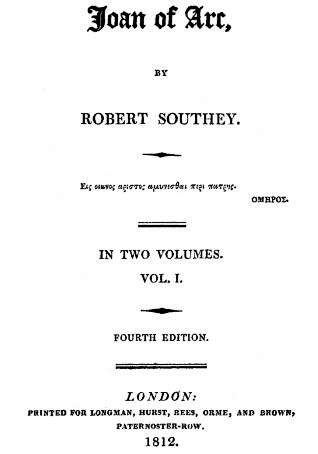This article needs additional citations for verification .(November 2013) |
| |||
|---|---|---|---|
| +... |
This article contains information about the literary events and publications of 1794.
This article needs additional citations for verification .(November 2013) |
| |||
|---|---|---|---|
| +... |
This article contains information about the literary events and publications of 1794.
Uncertain date

Robert Southey was an English poet of the Romantic school, and Poet Laureate from 1813 until his death. Like the other Lake Poets, William Wordsworth and Samuel Taylor Coleridge, Southey began as a radical but became steadily more conservative as he gained respect for Britain and its institutions. Other romantics such as Byron accused him of siding with the establishment for money and status. He is remembered especially for the poem "After Blenheim" and the original version of "Goldilocks and the Three Bears".
This article contains information about the literary events and publications of 1817.
This article contains information about the literary events and publications of 1816.
This article contains information about the literary events and publications of 1813.
This article contains information about the literary events and publications of 1790.
This article contains information about the literary events and publications of 1798.
This article contains information about the literary events and publications of 1775.
This article contains information about the literary events and publications of 1795.
This article contains information about the literary events and publications of 1762.
Nationality words link to articles with information on the nation's poetry or literature.
Nationality words link to articles with information on the nation's poetry or literature.
Nationality words link to articles with information on the nation's poetry or literature.
The following lists events that happened during 1794 in the French Republic.
Samuel Taylor Coleridge was born on 21 October 1772. The youngest of 14 children, he was educated after his father's death and excelled in classics. He attended Christ's Hospital and Jesus College, Cambridge. While attending college, he befriended two other Romanticists, Charles Lamb and Robert Southey, the latter causing him to eventually drop out of college and pursue both poetic and political ambitions.
Sonnets on Eminent Characters or Sonnets on Eminent Contemporaries is an 11-part sonnet series created by Samuel Taylor Coleridge and printed in the Morning Chronicle between 1 December 1794 and 31 January 1795. Although Coleridge promised to have at least 16 poems within the series, only one addition poem, "To Lord Stanhope", was published.
The Fall of Robespierre is a three-act play written by Robert Southey and Samuel Coleridge in 1794. It follows the events in France after the downfall of Maximilien Robespierre. Robespierre is portrayed as a tyrant, but Southey's contributions praise him as a destroyer of despotism. The play does not operate as an effective drama for the stage, but rather as a sort of dramatic poem with each act being a different scene. According to Coleridge, "my sole aim to imitate the impassioned and highly figurative language of the French Orators and develop the characters of the chief actors on a vast stage of horrors."

"To Southey" or "To Robert Southey" was written by Samuel Taylor Coleridge and published in the 14 January 1795 Morning Chronicle as part of his Sonnets on Eminent Characters series. Robert Southey became a close friend of Coleridge during the summer of 1794 and the two originally formed a plan to start an ideal community together. Although the plan fell apart, Coleridge dedicated the poem to his friend and emphasized Southey's poetic abilities. Following the poem, Coleridge further drifted from Southey and the poem was not republished.

Joan of Arc is a 1796 epic poem composed by Robert Southey. The idea for the story came from a discussion between Southey and Grosvenor Bedford, when Southey realised that the story would be suitable for an epic. The subject further appealed to Southey because the events of the French Revolution were concurrent to the writing of the poem and would serve as a parallel to current events. Eventually, Samuel Taylor Coleridge helped rewrite parts of the poem for a 1798 edition. Later editions removed Coleridge's additions along with other changes.
Robert Lovell (1771–1796) was an English poet who was known for his poem, Bristol: A Satire, which criticised the many merchants of Bristol and their involvement in "mortal corruption" which involved the slave trade.

Suzanne Rosette de Chabaud-Latour, known as Rosine de Chabaud-Latour, was a French religious thinker and translator. The daughter of an engineer who had served Napoleon, she was a prominent member of the protestant church in Nîmes and Paris. She translated the writing of English-speaking religious writers of the time, Thomas Adam, John Newton and William Romaine, into French, and her writing and thoughts were important to the development of protestant religious thinking in France during the Réveil. She was governess to François Guizot's children, including his daughter Henriette who later also became a writer and translator.
{{cite book}}: CS1 maint: multiple names: authors list (link){{cite book}}: CS1 maint: location missing publisher (link)